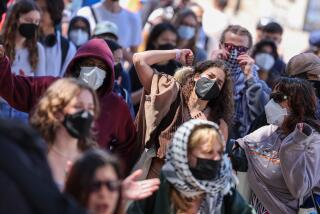‘92 POLITICAL PERSPECTIVE : Bush Steps Up His Criticism of Clinton Anti-War Activity : The President says at a fund-raiser that he does not mean to question his rival’s patriotism but that governor’s Vietnam-era actions trouble him.
- Share via
HOUSTON — President Bush on Thursday night intensified his criticism of Bill Clinton’s youthful involvement in Vietnam-era anti-war demonstrations in Britain, sending an already bitter campaign on an even more negative course.
Appearing at a celebratory fund-raiser here, Bush assured his audience that his attacks were not meant to cast doubt on his Democratic rival’s patriotism. But he said he remained troubled by Clinton’s role in organizing protests from foreign soil against U.S. policy when American soldiers were “dying halfway around the world.”
“I can’t understand someone mobilizing demonstrations in a foreign country when poor kids drafted out of the ghetto are dying in a faraway land,” he said in the speech, which was broadcast by satellite to Republican donors around the country. “You can call me old-fashioned, but that just doesn’t make sense to me.”
Bush said he had no objection to protests mounted on American soil. But he seemed to invoke the old dictum that “politics stop at the water’s edge.”
Clinton says he organized one demonstration in London, a “teach-in,” and attended one other protest at the American Embassy.
Bush’s remarks came only 24 hours after he said on CNN’s “Larry King Live” that Clinton was “wrong” to demonstrate against the war while overseas and called attention to a trip Clinton made to Moscow while a graduate student at Oxford University. At the same time, he admitted: “I don’t have the facts.”
The President’s top aides quickly took up the cudgel Thursday, accusing the Arkansas governor of being less than candid in describing the episodes. “It’s another vintage Clinton,” deputy campaign manager Mary Matalin said in New Orleans. “It’s pathological deception.”
And Vice President Dan Quayle said in a St. Louis television interview that if Clinton “organized an anti-American demonstration on foreign soil, he ought to apologize.”
But there were signs that the attacks were less than coordinated. Whereas Bush continued to emphasize his rival’s conduct, Matalin and White House Press Secretary Marlin Fitzwater sought to shift attention to the fact that the accounts Clinton has provided have sometimes been contradictory.
That subtle shift in course appeared to reflect concern that Bush’s attacks had an anachronistic tone and that Clinton’s conduct was not particularly unusual for a student of his generation.
Bush reinforced those aides’ assaults on Clinton’s credibility by mocking his rival for the apparently conflicting positions he has sometimes taken on policy issues. “When you’re President of the United States,” he proclaimed at a campaign event earlier in the day at the Port of New Orleans, “ maybe cannot be your middle name.”
With the candidates due to square off Sunday in the first of a series of debates crucial to his comeback hopes, the new flurry of Bush team assaults offered a preview of what are likely to be face-to-face attacks on Clinton’s character and conduct.
By using a live television appearance Wednesday night to depict Clinton as a young man sympathetic to Moscow at the height of the Vietnam War, Bush has added to a wild-swinging repertoire that in recent days also has seen him raise questions about his rival’s avoidance of the draft, his 1986 meeting with an Iraqi official in his role as Arkansas governor and his youthful experimentation with marijuana.
All are issues of which the Bush campaign has been aware for months; at a rally in Orange County last month, Rep. Robert K. Dornan (R-Garden Grove) even used a speech introducing Bush to accuse Clinton of spending his student days chanting anti-Vietnam War and pro-Viet Cong slogans.
At the time, White House aides took pains to avoid appearing in alliance with Dornan’s attacks. But now, eight months after Bush told an interviewer that he would do “what I have to do to be reelected,” he and his strategists appear to have concluded that there is little to lose by raising questions from which they had previously shied away.
Bush’s questions about Clinton’s conduct during the Vietnam War seemed to conflict with his own inaugural address in 1989.
In the address, he suggested that “the statute of limitations” had passed and that the war’s “final lesson” was “that no great nation can long afford to be sundered by a memory.”
Fitzwater insisted through an aide that the issue was Clinton’s credibility. “It’s another case where he can’t seem to tell the truth,” he told reporters aboard Air Force One, in a reference to Clinton’s weeklong trip to Moscow over New Year’s Eve in 1969 and to his role in organizing anti-war protests. “It’s another case of deception.”
Clinton’s visit to Moscow was part of a larger, 40-day tour that involved stops in several European countries.
As evidence of Clinton’s alleged untruths, Bush campaign officials, in conversations with reporters and in an earlier news release, have seized primarily on the various accounts Clinton has offered of his participation in anti-war demonstrations.
Bush, who began his campaign day in San Antonio, had made clear after a morning jog that there would be more to come. Asked if he had intended to question Clinton’s patriotism the night before, Bush said: “I said all I wanted to say about that last night. I probably will have more to say about that later.”
Times staff writer Robert Jackson, in St. Louis, contributed to this story.
More to Read
Get the L.A. Times Politics newsletter
Deeply reported insights into legislation, politics and policy from Sacramento, Washington and beyond. In your inbox twice per week.
You may occasionally receive promotional content from the Los Angeles Times.










